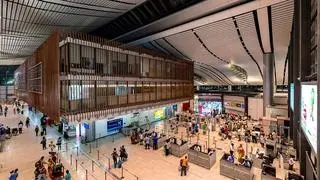Alexandre de Juniac, a former chairman & CEO of Air France-KLM, became the seventh person to head world airlines’ trade body, International Air Transport Association (IATA) when he took on the role of Director-General and CEO from September 1, 2016. A French national, de Juniac faces some tough challenges ahead that which includes protectionist policies and trade wars. In an interview with a group of Indian journalists, he shares the organisation’s stand on the Indian aviation industry, including privatisation of airports.
While IATA does not really make an intervention with regard to how governments run their aviation industry, how does the industry body like yours view divestment of Air India?
We obviously don’t have a position on the divestment. What we can say is that if it has to be done then it should maintain or improve the competitiveness of the market. It should also devout the same resources accorded to Air India to be extended it to the other airlines as well. It should also not harm the interest of any competing airlines, including international airlines. There should be fairness, equality and transparent.
During the last two years, several Indian domestic airlines have shut down including Jet Airways. How does IATA view this scenario?
When big players go bankrupt it raises several questions. Firstly, we can see that the operating cost for airlines in India is too high. While the competition is quite high, there is an enormous pressure on P&L and combine that with high infrastructure costs and fuel charges, you know where they are heading. High costs makes life difficult for the operators. What the government should do is to lower the costs relating to taxation. We know that the Indian government is trying to privatise airports but it is not a magical solution. We have a list of do’s and don’ts on how to carry out privatisation. In one case, we had warned about the consequences of awarding a contract to a company which had promised highest possible revenues. We knew that the operator will increase airport charges. It did happen and later the government asked them to lower these charges.
As an industry body, how much of hold you have to influence governments to either adopt or change certain policies?
We have the advocacy and lobbying power. We have the financial means to pay for the best experts, have quality surveys conducted and our global footprint allows us to have independent, neutral voice. We also publish data about each country and how competitive they are in terms of KPIs. Countries do know our importance because of the position we have in the world aviation industry.
SpiceJet and IndiGo, both LCCs joined IATA recently. Why did it take them such a long time to join the industry body?
Both of them are low cost. They were not too keen to participate in BSP (Billing & Settlement Plan) earlier and felt that the membership costs are too high. For LCCs, any additional cost is viewed with suspicion. They also felt that IATA is only for legacy carriers. They also wanted rebates which our members did not agree to. But we spoke to them to clear their doubts. Now they are on board and without getting any rebates. We suggested to IATA members that we should have second tier with lower membership fees for LCCs but it was turned down by the members.
How do you view Pakistan closing its airspace five times during the course of this year?
Negatively. Such actions significantly increase the length of the route. However, if it is a war zone, then such ban is justified. But one must credit India for helping international airlines with solutions which was quite laudable. We have spoken to the Pakistan government about the airspace ban.
CORSIA (Carbon Offsetting Scheme for International Aviation) is expected to kick in from January 2021. But imposition of such a regulation might actually impact airlines such as SpiceJet which are just starting to grow their international routes…
I don’t think so at all. It will not hamper the growth of anyone nor will it hamper the position of the developing countries. I am not worried at all but what I am worried is about the tax policy or the carbon tax set to be imposed by certain airlines which will obviously reduce the impact of CORSIA. What also I don’t understand is why is India working against CORSIA in spite of having signed the Paris Agreement.
I have never understood their position on this. They may feel that it is against the interest of the country but it is not. (In 2016, the International Civil Aviation Organisation adopted CORSIA to achieve its aspirational climate goals of increasing fuel efficiency by 2 per cent per year and carbon-neutral growth of civil aviation from 2020 onwards. (The market-based mechanism aims to cap aviation’s future emissions growth by obliging airlines to buy offsets, rather than requiring airlines to reduce aircraft emissions).
The writer is in Geneva at the invitation of IATA







Comments
Comments have to be in English, and in full sentences. They cannot be abusive or personal. Please abide by our community guidelines for posting your comments.
We have migrated to a new commenting platform. If you are already a registered user of TheHindu Businessline and logged in, you may continue to engage with our articles. If you do not have an account please register and login to post comments. Users can access their older comments by logging into their accounts on Vuukle.